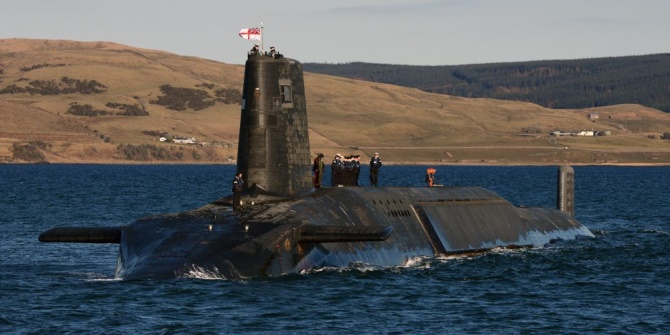
 As the independence referendum date draws closer, there has been a retreat from the bold vision espoused by Scottish government ministers regarding defence and security in an independent Scotland, argues Fiona Veitch and Gordon Heggie. The opportunity exists for Scotland to move closer to the ideal of a less militarized view of national identity and follow the example of the devolution project, which sought to raise the issue of gender in Scottish politics.
As the independence referendum date draws closer, there has been a retreat from the bold vision espoused by Scottish government ministers regarding defence and security in an independent Scotland, argues Fiona Veitch and Gordon Heggie. The opportunity exists for Scotland to move closer to the ideal of a less militarized view of national identity and follow the example of the devolution project, which sought to raise the issue of gender in Scottish politics.
Writing in this blog, James Mitchell noted that three broad ‘everyday’ issues – the economy, welfare and defence represent the ‘core’ of the forthcoming Scottish independence referendum. The thrust of his argument is to challenge the notion that ‘constitutional politics’ are in someway superior to ‘ordinary politics’. The broad area of defence and security is a policy area that is gradually becoming part of the everyday independence debate. Yet this debate appears to be framed within the traditional public/private divide, with high politics reflecting the elite world of masculine defence and security discourses. The dominant themes thus far have centered on traditional notions of Scottish regiments, NATO membership, defence contracts and economic arguments, with Scotland replicating the same perspective on military power as its UK counterpart, albeit within a reconfigured structure.

What happened to doing things differently? Devolution after all, was about grasping the opportunity to improve the political process. The term ‘new politics’ was frequently used to encapsulate this bold vision, and whilst this notion has all but been discredited, it did according to Michael Keating represent a desire ‘that home rule should not merely substitute a Scottish Parliament for the Westminster one.’ In short, devolution would enable Scotland to depart from the type of politics associated with ‘old Westminster’, a vision that was clearly articulated in the Scottish Parliament’s founding principles, with equal opportunities and microcosmic representation, including gender at the core.
In broad terms Scottish government ministers appear to be offering something different, and have in the past articulated an alternative view, for example the SNP’s policy towards the war in Iraq, their opposition to Trident and nuclear weapons. Independence will, according to Veterans Minister Keith Brown, enable Scotland to fulfill its role as a ‘good global citizen’, to develop a ‘positive approach on wider issues of global security such as economic and social justice, environmental and climate security, and the promotion of human rights’. In short, as Humza Yousaf the Scottish Minister for External Affairs explained, independence is an ‘opportunity for Scotland to show leadership, to help bring closer the world we want to see…to develop global recognition in advocacy, peacebuilding and peacekeeping, as well as human and natural resource security.’ As Alex Salmond told delegates at the 2013 SNP conference, ‘we seek a country which judges its contribution on how useful it can be to the rest of humanity not on how many warheads it can balance on a Trident submarine.’
Similar sentiments can be found within the broader pro-independence movement. The Yes Scotland campaign cites a UN Report on Human Development and comments that ‘we can re-prioritize spending, and choose what we value most.’ As the UN Report says: ‘Even where fiscal consolidation is necessary, it need not involve cuts in welfare services.’ For example, in a global context they point out that military spending, which amounts to more than the GDP of the world’s 50 poorest countries combined, could be reduced. In a Scottish context, this points to one clear way to reduce the deficit: we could switch some spending from military to welfare.
However, a cursory glance beyond this broad rhetoric provides evidence that a retreat from these alternative visions is underway. It was only in 2011 that Alex Salmond was fondly quoting the words that Edwin Morgan wrote to commemorate the opening of the Scottish Parliament in 2004, reminding delegates ‘we give you our deepest dearest wish to govern well, don’t say we have no mandate to be so bold.’ The same 2011 address echoed this boldness by stressing that the ‘pursuit of the common weal, the community of the realm’ was central to ‘building the new Scotland’, based on a ‘community identity which was beyond sectional interest.’
As the independence referendum date draws closer has there been a retreat from the bold vision of 2011. This seems to imply an ‘independence light’ outcome, with reference to the common weal all but disappearing. Alex Salmond’s 2013 conference speech made no reference to this concept. A similar retreat occurred in 2012 when the decision was taken to reverse the long-standing SNP anti-NATO policy.
Yet this alternative bold vision does exist. The Common Weal Project expresses a Human Security agenda which advocates a different approach to Human Security than the traditional, masculinist stance of defence and security. This provides the opportunity to consider feminist perspectives and narrow the socially constructed and contested ‘public-private’/’high-low’ divide that resonates in current national security discourses. The opportunity exists for Scotland to move closer to the ideal articulated by Tickner of a less militarized view of national identity and follow the example of the devolution project, which sought to raise the issue of gender in Scottish politics. Sadly, this lack of gender perspective and analysis in issues of defense and security confirms the myth of a ‘new politics’ and belies the vision espoused by Morgan.
Note: This article gives the views of the author, and not the position of the British Politics and Policy blog, nor of the London School of Economics. Please read our comments policy before posting.
 Fiona Veitch is a politics lecturer in the School of Social Sciences at the University of the West of Scotland. Her research interests include gender, religion and is currently working on a series of co-authored articles relating to the politics of rendition.
Fiona Veitch is a politics lecturer in the School of Social Sciences at the University of the West of Scotland. Her research interests include gender, religion and is currently working on a series of co-authored articles relating to the politics of rendition.
 Gordon Heggie is a politics lecturer in the School of Social Sciences at the University of the West of Scotland. His research interests are in broad of Scottish and EU politics and is currently working on a series of co-authored articles relating to the politics of rendition.
Gordon Heggie is a politics lecturer in the School of Social Sciences at the University of the West of Scotland. His research interests are in broad of Scottish and EU politics and is currently working on a series of co-authored articles relating to the politics of rendition.





